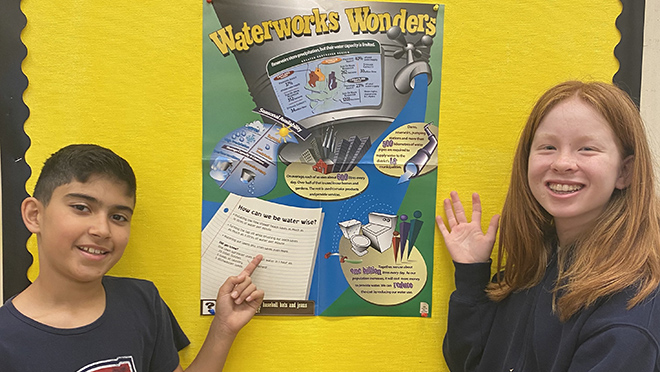North Van students raise awareness of water conservation issues

Passionate and informed, younger generations are leaders in sustainability
Snow melt in B.C. began earlier than usual this spring, and there wasn't a lot of snow to begin with. As of mid-April, snowpack in our mountains averaged 64% of the historical median.
Bad news, for sure, but Maria Power saw it as another opportunity to inspire kids around Earth Day and water conservation.
"I would say the number one way to get students engaged is to make sure there's some pertinence," says the teacher at North Vancouver's L'École Cleveland Elementary. "I thought this would be a good time to start people thinking about their water use even before restrictions come into place."
It all started with a discussion, then a challenge. She asked her students to come up with ways they could help conserve water. After collecting ideas that ranged from the routine (shut water off while brushing teeth) to the innovative (fill buckets under the shower while the water's warming up), she pushed the challenge school-wide.
The class put together a survey for the bilingual school – with questions in both English and French – and distributed them in pairs to 18 other divisions. Questions on the survey included:
- Do you take short showers? Under 10 minutes or under five minutes?
- Do you water the garden/lawn only early in the morning or late at night?
- Do you use a broom instead of a hose to clean up outside areas?
- Do you collect rainwater outside for watering garden pots?
- Do you reuse water after you've boiled or steamed something?
They also took the survey home to parents, who might just need the help. While younger generations have grown up in the bullseye of climate change, a lot of us grew up largely ignorant of sustainability issues, despite calls for action that began with Rachel Carson's book Silent Spring way back in 1962. There were anti-litter campaigns, but water conservation was on almost no one's radar, and outdoor learning, including field trips into the forest, was uncommon.
"I went to school in urban Vancouver," says Power, who was born in 1970. "I remember us walking up to a park nearby and playing kick the can. That was about it for being out in nature. I don't remember any restrictions on water use. But the population has probably doubled since."
Tips and strategies for another dry B.C. summer
The head of B.C.'s River Forecast Centre confirmed in May what Power's North Vancouver students had learned a month earlier. Dave Campbell said that parts of B.C. will likely enter "unfamiliar territory" with drought if they see another hot, dry summer.
Nearly 60% of the province was already at drought Level 2 or 3 by mid-May, and the highest drought level is 5. The government of B.C. has already asked heavy industrial users to cut back on water use, and has urged all of us to do our part to conserve water.
"We need to learn that water here in British Columbia is sadly not a resource that is as abundant as it may have been in years past as a result of climate change," said B.C.'s Emergency Management Minister Bowinn Ma.
Along with the above tips offered by L'École Cleveland Elementary students, here are some ways you can help conserve water this summer.
- Let that lawn go brown, or rewild your yard: A brown lawn isn't a dead lawn. Let it go, or consider turning it into a meadow of drought-resistant native plants.
- Water plants strategically, early in the morning: Water slowly, in the morning, by hand, near the roots. Break up hardened dirt to allow water to soak in, and consider adding mulch to your gardens, as it shades soil and helps conserve soil moisture.
- Stop handwashing dishes: According to a German study at the University of Bonn, a full dishwasher load can wash 144 items with 13 litres of water, while hand washing those same items uses 100 litres on average.
- Install low-flow showerheads: Low-flow, energy-efficient showerheads will help cut down on the amount of water you use, without sacrificing water pressure or your shower time.
- Get a rain barrel: It's a little late to do it this summer, but consider adding a rain barrel to your yard to grab the freely available rain for when you need it.
- Install faucet aerators: Low-flow faucet aerators help you cut down on water use, which will cut down on your electricity costs. Installing a high-efficiency aerator on your kitchen sink could save you $28 per year in hot water costs.
- Flush your toilet less: According to the City of Vancouver, the biggest water use in your home is from flushing your toilet, at an average of 24%, followed by showers at 20%. Try to avoid flushing when you don't have to – and consider employing the cottage life mantra: 'If it's yellow, let it mellow'.